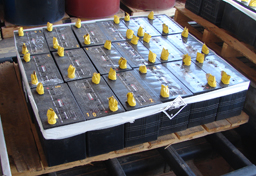March 23, 2011
In 2004, the US Geological Survey estimated that 95% of lead in the United States is recycled, primarily from used lead acid batteries. A broader 2009 European study estimated that globally about 52% of lead is recycled, and a 2008 Asian study estimated a global recycle rate of 68%. Unfortunately, many incidents over the past decade of mass illnesses and population die-offs due to lead poisoning have been reported in Africa and Asia. Lead is a valuable scrap metal, and these incidents result from unsafe practices utilized by the poor to smelt and capture lead from used batteries.

Sandia National Laboratories/New Mexico generates as many lead acid batteries as a large automotive repair shop. While all the lead acid batteries are processed and recycled legally under a regularly audited New Mexico hazardous waste management permit, Pollution Prevention (P2) was prompted to perform a due diligence audit to examine this recycle stream from an environmental justice point of view.
The goals of P2’s audit were to verify that no lead acid batteries are being exported from the United States by our contracted vendors, and to educate involved members of Sandia’s workforce about the global issues surrounding lead recycling.
Both of these goals were accomplished. P2 found that all of Sandia’s lead acid batteries are being smelted (recycled) within the United States, and P2 is working within Sandia to rewrite service contracts to make sure it stays this way.